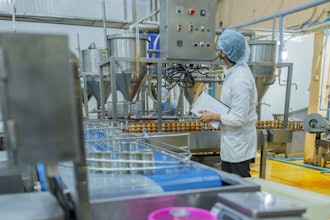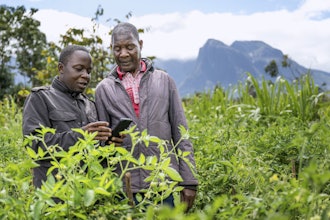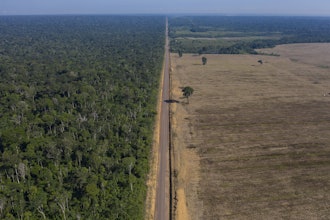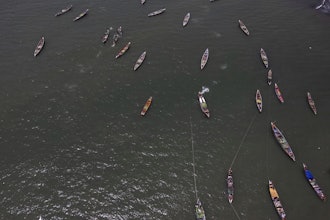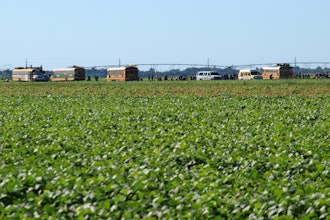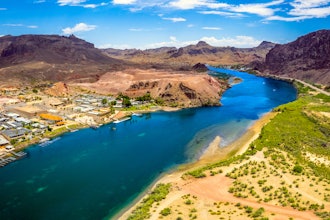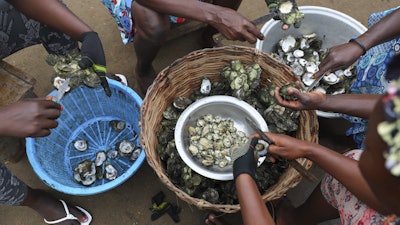
TSOKOMEY, Ghana (AP) — Beatrice Nutekpor weaves through the mangroves in Tsokomey community, just outside of Ghana’s capital of Accra, every day to harvest oysters for sale. It’s a family tradition she’s been doing since she was 15. Now 45, she is struggling to sustain the practice and pass it to her daughter.
In Ghana’s coastal mangroves, oyster farming has been a key source of livelihood dominated for ages by women. Hundreds of women were trained in eco-friendly farming methods for oysters, including mangrove planting and preservation, and selective oyster harvesting, to lessen the impact of climate change.
Mangroves, trees or shrubs that grow along coastlines serve a critical multifunctional purpose in the aquatic ecosystem, ranging from being a home to fish to providing a buffer for coastal erosion from rising sea levels, and protection to land during storms and cyclones.
However, training by the Development Action Association nonprofit has ended after it lost its U.S. aid as a result of U.S. President Donald Trump's decision to cut foreign aid contracts. It left the women to try what they can to keep their generational practice and sustain their families as Ghana emerges from its worst economic crisis in a decades.
Their efforts to protect the mangroves from encroachment and preserve them for a longer period of up to six months are gradually paying off. “The oysters have started attaching themselves to the mangroves we have planted,” Nutekpor says.
A key source of living challenged by climate change
Oyster farming involves breeding oysters in a controlled aquatic environment for commercial purposes.
Much like the rest of coastal West African nations, Ghana has lost a significant portion of its mangroves to climate change and development. There is no available data on recent depletion, but over 80% of the original mangroves have been lost since the last century.
Mangroves are also increasingly threatened by climate change as global temperatures and sea levels rise.
A single basin of oysters sells for roughly 47 Ghanaian cedis ($4), and Nutekpor sells just enough to feed her family and put her daughters through school.
As mangroves are depleted by people in search of firewood, development has crept into the coastal areas and authorities release water from overflowing dams, endangering the forests. Nutekpor’s worst nightmare is already manifesting: This year saw less oysters compared to last year, according to Lydia Sasu, the executive director of the Development Action Association.
For farmers like Nutekpor, the loss of mangroves means risking drowning by free diving 30 feet (9 meters) or deeper for hours, in search of oysters that migrate to deeper water in the absence of mangrove roots.
“When you have a situation where the water body, which is already dynamic, becomes more dynamic than before, the oysters cannot grow,” said Francis Nunoo, a professor of fisheries science at the University of Ghana.
Doing it all for family, and future generations
Although replanting the mangroves have paid off for the women, it is a back-breaking job that keeps them in the harsh sun for hours.
For the sake of family, it is worth it, they say.
“We keep doing it for the sake of our children and generations to come,” said Bernice Bebli, 39, another oyster farmer. “The water is our livelihood.”
In a group called the Densu Oyster Pickers Association, they have set out guidelines, including punitive measures for those who cut the mangroves outside of the allowed timeline.
According to Bebli, first-time offenders will lose their oysters, while repeated offenders are reported to the police.
“The reliance of the coastal people on these ecosystems is heavy. … The rate of destruction is always higher than the rate of repopulation, so we are going to lose some species and we are going to lose some lives,” said Nunoo.
For Nutekpor, keeping her family's heritage is key.
“Just as my mother taught me this business, I also want to teach my daughter so she can teach her child. Then oyster farming will remain our family business,” Nutekpor said.










